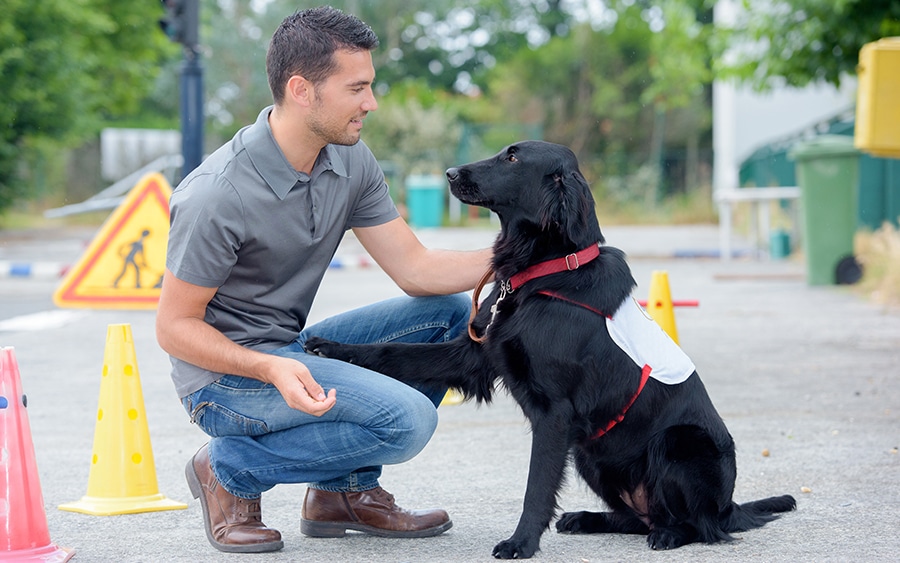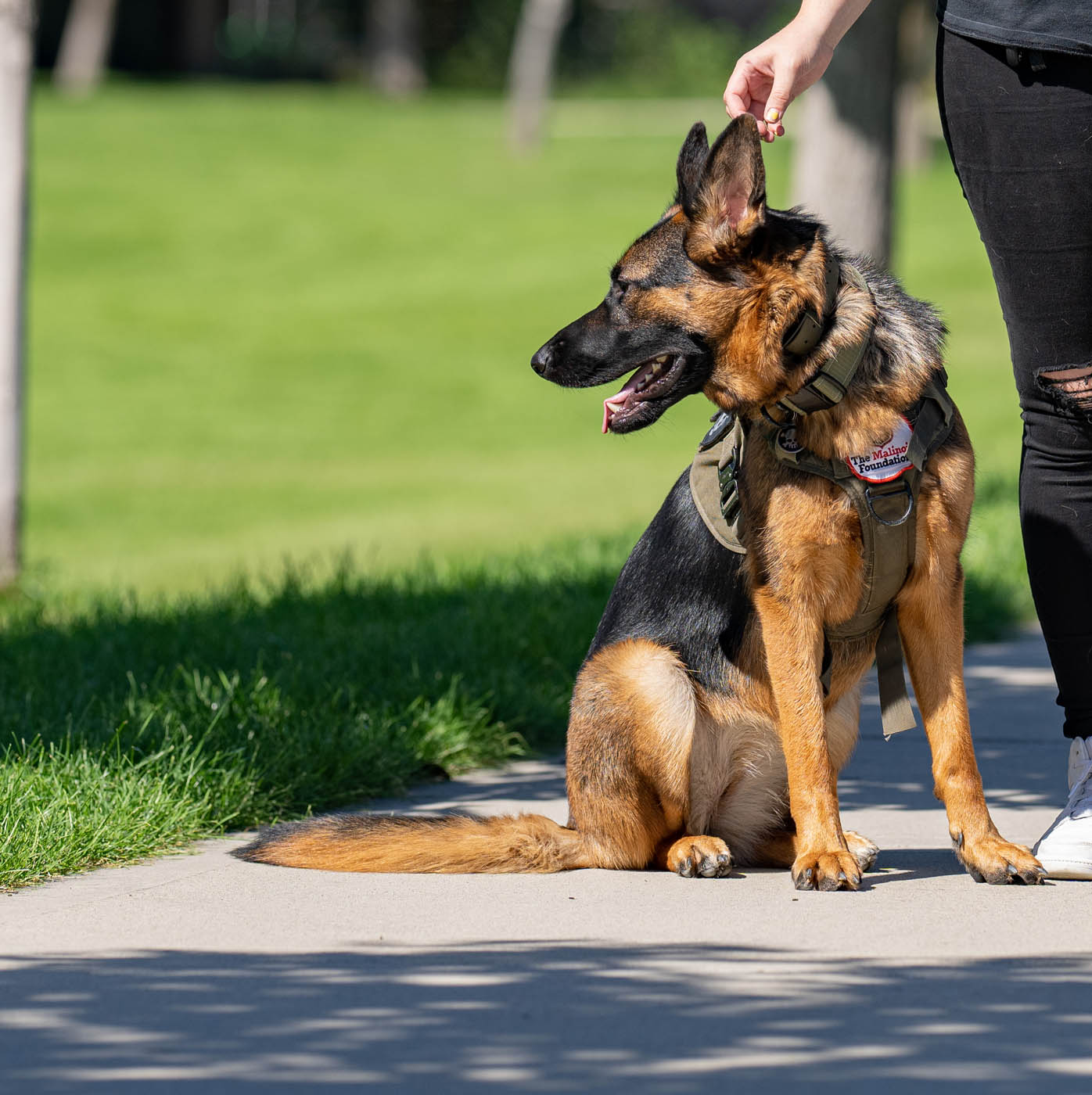Unlock the Tricks of Efficient Dog Training Near Me for a Better Pet
Unlock the Tricks of Efficient Dog Training Near Me for a Better Pet
Blog Article
Unlock Your Dog's Potential: Proven Pet Dog Training Approaches for Success
Reliable pet dog training is a nuanced process that pivots on comprehending canine behavior and using clinically backed techniques. By including positive support, establishing clear commands, and focusing on socialization, dog owners can grow an efficient partnership with their family pets.
Understanding Pet Dog Behavior
Comprehending dog habits is essential for efficient training and cultivating a positive connection between canines and their proprietors. A detailed understanding of canine body movement, articulations, and social communications is vital for recognizing their emotions and requirements. Pet dogs connect primarily via non-verbal cues; for example, a wagging tail may show excitement, while pinned ears can signify anxiety or entry.

Furthermore, ecological variables play a substantial function in forming a pet's actions. Changes in regular, new environments, or the existence of strange individuals can bring about tension or anxiousness in pet dogs. Recognizing these triggers makes it possible for proprietors to minimize unfavorable responses and develop ideal training techniques.
Ultimately, a deep understanding of pet habits lays the structure for effective training approaches, improving both habits and the total bond between the canine and its proprietor. dog training charlotte nc. This understanding is vital for promoting a well-adjusted, delighted canine companion
Positive Reinforcement Methods
Effective training counts greatly on positive reinforcement methods, which have been shown to produce substantial outcomes in forming wanted habits in canines. This technique includes awarding a canine for showing details behaviors, thereby raising the likelihood that these behaviors will certainly be duplicated. Incentives can take numerous types, consisting of deals with, praise, toys, or playtime, depending upon what encourages the specific canine.

It is necessary to progressively phase out incentives as the pet finds out the behavior, transitioning to recurring support. This technique preserves the behavior gradually while stopping dependence on continuous rewards. By concentrating on positive support, instructors can cultivate a relying on connection with their dogs, advertising a cooperative and healthy and balanced training setting that improves general obedience and efficiency.
Establishing Regular Commands
An essential facet of successful pet training is the establishment of constant commands. Uniformity in commands is important for efficient interaction between the instructor and the canine. When commands are uniform, dogs learn to associate particular words with wanted habits, which accelerates the training procedure and improves understanding.
To develop consistent commands, it is important that all household members utilize the very same terminology and gestures. As an example, if a single person utilizes "rest" while an additional states "rest down," it can create confusion for great site the pet. Select site clear, distinct words for commands and guarantee everybody associated with the dog's training sticks to these options.
Furthermore, rep is key. Reinforce commands through regular technique, making sure that the dog gets adequate possibilities to react appropriately. When a dog successfully complies with a command, immediate favorable support ought to adhere to. This can be in the type of deals with, praise, or playtime, solidifying the connection between the activity and the command.
Last but not least, be client. Establishing regular commands requires time and initiative. With commitment and clearness, you will help your canine develop a solid understanding of assumptions, eventually resulting in a well-behaved friend.
Socializing and Exposure
Socializing a pet is important for fostering a certain and well-adjusted buddy. This process includes exposing your dog to a range of environments, individuals, and other animals to develop their social abilities and adaptability. Early socializing, ideally in between the ages of three to fourteen weeks, is essential, as it lays the foundation for a pet dog's future behavior.
Throughout socialization, purpose to supply positive experiences in various settings, such as parks, hectic streets, and homes with other pets. Present your dog to different stimulations, including audios, sights, and scents, guaranteeing that each experience is gratifying. This direct exposure helps alleviate fear and stress and anxiety, leading the way for an extra resilient pet dog.
Engaging in controlled group play sessions with various other pets can also enhance social skills, instructing your family pet proper communications and borders. Focusing on socializing will dramatically contribute to your canine's overall happiness and behavior throughout their life.
Conquering Common Educating Obstacles

Dogs may battle to concentrate in unknown or active settings. Gradually desensitize your canine to disturbances by beginning training in a quiet environment and slowly introducing even more stimulations as they become skilled.
In addition, behavior concerns like jumping or excessive barking can become aggravating. Address these by showing different actions, such as resting steadly when welcoming visitors. Uniformity and perseverance are crucial; reinforce desired behaviors regularly and prevent scolding, which can result in confusion.
Lastly, recognize that each dog is unique, and training timelines may differ. Dressmaker your strategy to your pet's specific demands, and look for expert assistance if required. With determination and the best techniques, overcoming these challenges can lead to a well-trained, pleased canine companion.
Conclusion
In verdict, opening a pet dog's prospective necessitates a comprehensive strategy that integrates an understanding of canine habits, the application of positive support methods, and the establishment of regular commands. my blog Early socializing and exposure to varied settings additionally enhance a pet's versatility and confidence. By resolving typical training challenges with customized methods and patience, a unified and participating relationship in between canine and trainer can be promoted, ultimately leading to a well-behaved buddy capable of growing in various scenarios.
Effective pet training is a nuanced process that pivots on understanding canine actions and employing medically backed strategies.Recognizing dog habits is important for efficient training and fostering a positive partnership in between dogs and their proprietors.Reliable training relies greatly on favorable reinforcement methods, which have actually been shown to produce substantial results in shaping wanted behaviors in canines. When commands are consistent, dogs discover to link specific words with preferred habits, which increases the training process and enhances understanding.
In final thought, opening a dog's potential requires a thorough strategy that incorporates an understanding of canine habits, the application of favorable support methods, and the facility of regular commands.
Report this page